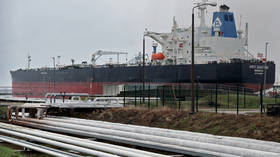Swiss-based firms keep Russian fuel flowing – FT

Two of the world’s major energy traders, Vitol and Gunvor, remain significant buyers of refined oil from Russia despite their pledge to reduce business with the sanctions-hit country, the Financial Times reported on Tuesday.
The outlet has analyzed export records filed with Russian customs in the first four months of 2023, which reportedly show that both companies were among the top ten buyers of Russian refined oil products, such as petrol and diesel.
Switzerland-headquartered Gunvor was reportedly the eighth-largest buyer by value, shipping a million tons of petroleum products worth about $540 million. Vitol, whose top executives are also mainly based in London and Geneva, was the tenth-largest buyer, shipping around 600,000 tons worth about $400 million, the FT reported.
In total, 50 companies exported a combined $16 billion worth of refined petroleum from Russia over the first four months of this year, according to data reviewed by the outlet.
Trading in Russian refined fuels is not prohibited under Western sanctions as long as traders comply with restrictions. In December 2022, the EU, G7 nations, and their allies introduced a collective ban on Russian seaborne oil exports, along with a price cap of $60 per barrel. Another embargo banning almost all imports of refined Russian oil, as well as introducing price caps on diesel and other petroleum products, came into force on February 5.
Both Vitol and Gunvor stated they had stopped trading in Russian oil but confirmed they were regular buyers of refined fuels from the sanctioned country, disputing the accuracy of the data in possession of the FT.
Gunvor insisted that according to its own records the company had purchased just over 700,000 tons during the stated period, with a value of about $330 million. Vitol also argued that the customs declarations did not match its internal figures but declined to provide its own data. The company explained that Russian customs records were sometimes filed after cargoes leave the country, meaning Vitol shipments from December, for example, may have been recorded for January.
The Swiss-based firms stressed that their exports of refined Russian petroleum products comply with regulations.
According to the FT, the other eight biggest buyers are a “mixture of Russian-controlled traders and recently established entities in the United Arab Emirates, Hong Kong or Singapore.”
For more stories on economy & finance visit RT's business section













